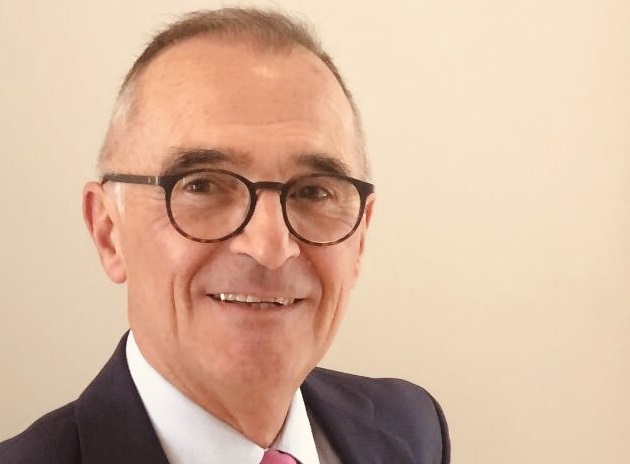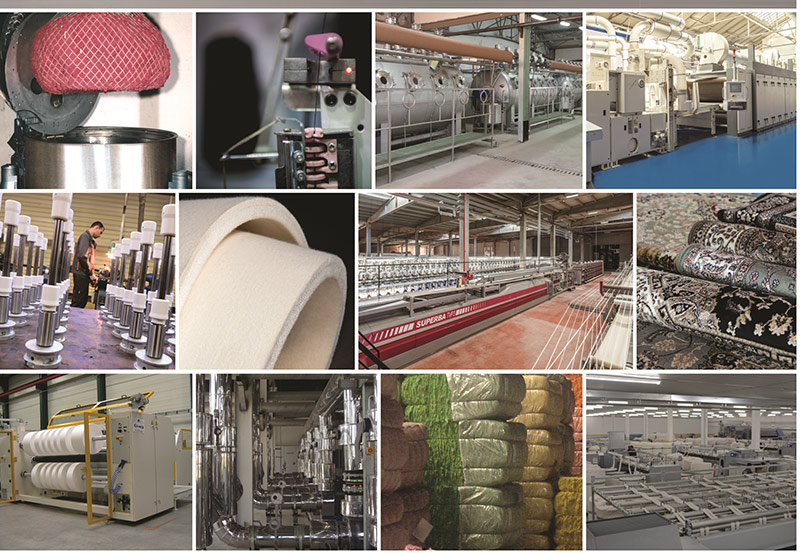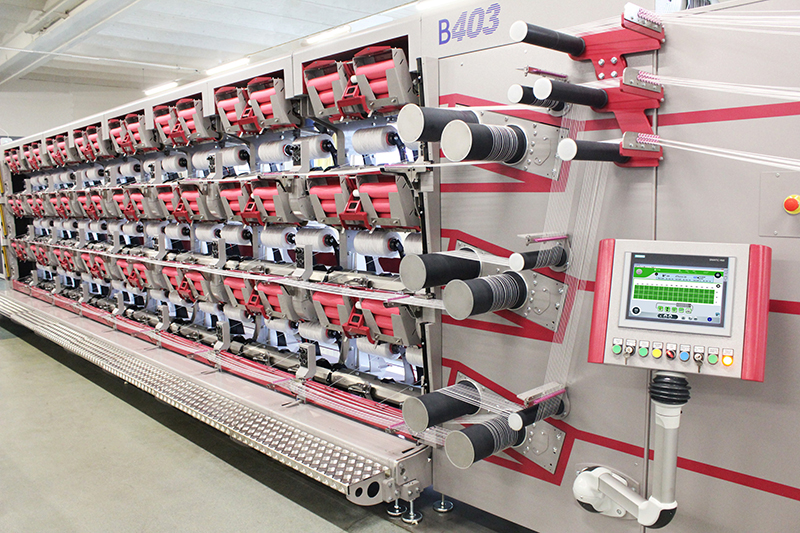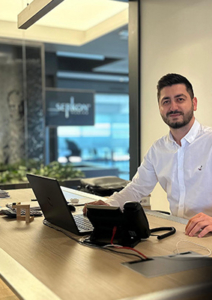It is Essential for French Textile Machinery Manufacturers to Invest in Innovative Technologies
Interview: Dilek Hayırlı
Recognizing today’s challenges, French textile machinery manufacturers are trying to position themselves as industry leaders in the future by adopting a visionary approach and investing in cutting-edge solutions.” says Mireille Jautzy, Secretary General of the UCMTF.
 The French textile machinery manufacturers play a crucial role in the production of textiles, from the raw material stage to the finishing and confection stages. These manufacturers are known for their expertise across various aspects of textile production, including preparation, weaving, knitting, finishing, dyeing, printing, and garment making.
The French textile machinery manufacturers play a crucial role in the production of textiles, from the raw material stage to the finishing and confection stages. These manufacturers are known for their expertise across various aspects of textile production, including preparation, weaving, knitting, finishing, dyeing, printing, and garment making.
French textile machinery builders, represented by members of the UCMTF (Union of Textile Machinery Manufacturers in France), are key players in driving collaborations and advancements within the textile industry. By partnering with other industry stakeholders such as textile manufacturers, designers, researchers, and end users, French textile machinery builders are able to develop innovative solutions that address the specific challenges faced by the markets of clothing, furnishings, and technical textiles.
In the realm of technical textiles, which play a critical role in industries such as healthcare, construction, aerospace, automotive, and machinery, collaborations between French textile machinery builders and other stakeholders are driving significant advancements. For instance, in healthcare, technical textiles are being used to develop innovative medical devices, protective clothing, and advanced wound care products. By collaborating with healthcare providers and researchers, French textile machinery builders can develop equipment that ensures the highest standards of quality and safety in medical applications.
Mireille Jautzy, Secretary General of the French Textile Equipment (UCMTF), spoke to our Tekstil Teknoloji magazine about the performance of French manufacturers in 2024, their expectations for the future of the sector, and their sustainability-focused technological transformations. The highlights of the interview are as follows:
What kind of transformation do industrial digitalization and automation create in textile machinery production? How do you contribute to this transformation as UCMTF?
 By using advanced techniques and technologies, French manufacturers are optimizing the solutions to meet the highest standards of performance and environmental sustainability. In the realm of sports equipment, French textile machinery manufacturers have developed state of the art solutions to enhance textile performance, efficiency and, depending on the final use, safety. For the 2024 Olympics, there has been a significant emphasis on creating high performance technical fabrics that offer superior functionality and comfort for athletes for instance. French textile machinery manufacturers are constantly introducing innovative weaving and knitting techniques to produce fabrics with enhanced breathability, moisture wicking properties, and durability.
By using advanced techniques and technologies, French manufacturers are optimizing the solutions to meet the highest standards of performance and environmental sustainability. In the realm of sports equipment, French textile machinery manufacturers have developed state of the art solutions to enhance textile performance, efficiency and, depending on the final use, safety. For the 2024 Olympics, there has been a significant emphasis on creating high performance technical fabrics that offer superior functionality and comfort for athletes for instance. French textile machinery manufacturers are constantly introducing innovative weaving and knitting techniques to produce fabrics with enhanced breathability, moisture wicking properties, and durability.
Moreover, the clients or final clients of the textile solutions enabled by the textile equipment manufacturers have also contributed to innovations in building materials to ensure sustainable and energy efficient construction for the sports facilities hosting the Paris Olympics.
“Our Companies Develop Solutions for Hemp Textiles”
Have there been any developments in the R&D investments of textile machinery manufacturers in France? What kind of innovative projects are there in the French textile machinery sector in terms of clean production processes and the use of recyclable materials?
 Innovation and service are embedded in the DNA of UCMTF’s members. They are long term technology & sustainability partners of their customers. Most of them are small or medium sized companies, even if part of international groups. Specialty equipment which can be custom made are a major part of the range of solutions offered by them. They are future oriented, for example developing solutions for hemp textile and/or reaching greener processes, such as natural dyeing.
Innovation and service are embedded in the DNA of UCMTF’s members. They are long term technology & sustainability partners of their customers. Most of them are small or medium sized companies, even if part of international groups. Specialty equipment which can be custom made are a major part of the range of solutions offered by them. They are future oriented, for example developing solutions for hemp textile and/or reaching greener processes, such as natural dyeing.
In an ever-evolving world, French textile machinery manufacturers face unprecedented technological challenges. Rapid advances in new technology require these manufacturers to adapt to remain competitive on the global stage. The present and future challenges they face call for a proactive, innovative approach to ensure their longevity and market leadership.
One of the key issues faced by French textile machinery manufacturers is the shifting expectations of consumers. Today, consumers demand high quality, durable, and personalized textile products. To meet this demand, manufacturers are turning to cutting edge technologies to not only improve their production processes but also deliver bespoke solutions.
Another major challenge for French textile machinery manufacturers is adapting to increasingly stringent environmental standards. Amid growing awareness of environmental concerns, it becomes paramount for manufacturers to adopt sustainable practices throughout their production chain. This can involve incorporating eco-friendly technologies, such as energyefficient machines, repairability and best maintenance.
With rapid market shifts and swift technological advancements, French textile machinery manufacturers must also remain at the vanguard of innovation. This necessitates substantial investment in researching and developing cutting edge technologies such as Artificial Intelligence (AI), Internet of Things (IoT), and breakthrough digital technologies. By positioning themselves as pioneers in adopting these technologies, French manufacturers can enhance their competitiveness and offer state of the art production solutions.
Addressing these challenges requires long term, forward thinking solutions to ensure future success. In the coming decades, it is essential for French textile machinery manufacturers to anticipate emerging trends and invest in innovative technologies to remain relevant on the global market. This could include developing “smart” textile machines with self optimizing capabilities, use of bio-sourced and recyclable materials and transitioning towards fully digitized production processes.
In conclusion, while French textile machinery manufacturers face significant challenges concerning new technologies, these challenges also present unique opportunities to drive innovation and growth. By taking a visionary approach and investing in cutting edge solutions, these manufacturers have accepted today’s challenges and strive to position themselves as industry leaders for the future.
The insufficiency of qualified labor in the textile machinery sector is frequently mentioned. What kind of education policy is being followed as UCMTF to overcome this problem? What should be done for the younger generation of engineers to take more place in this sector?
French textile machinery manufacturers are involved in major engineering schools, particularly ENSISA, with the aim of raising awareness of the world of textile machinery and supporting students towards a future career in their companies.
They also in apprenticeship students who are both a resource on which to build future salary strength, but also a provider of dynamism and highly valued solutions.
How are the collaborations of French textile machinery manufacturers abroad developing?
In today’s rapidly evolving world, collaboration between companies has become essential for driving innovation and addressing the challenges faced by industries like clothing, textiles, and technical textiles. French textile machinery builders are at the forefront of these collaborations, working towards sustainable solutions that will shape the future of various sectors such as healthcare, construction, aerospace, automotive, and machinery.
Collaborations between companies within the textile industry play a vital role in addressing sustainability issues and driving innovation. By working together, companies can leverage their combined expertise to develop solutions that enhance efficiency, reduce environmental impact, and meet the evolving needs of customers.
Looking ahead to coming decades, French textile machinery builders are expected to continue leading the way in developing sustainable solutions for the markets of clothing, furnishings, and technical textiles. Collaborations will play an even more significant role in driving innovation, as companies work together to address climate change, resource scarcity, and other global challenges. By embracing technologies such as artificial intelligence, robotics, and even nanotechnology, French textile machinery builders ready to embrace the future!
“French Manufacturers Target Promising Markets”
Energy crisis, wars, increase in raw material prices, etc. problems affect the textile machinery sector as well as all other sectors. How are UCMTF member companies affected by these crises? What is the roadmap of the companies regarding this process?
As French textile machinery manufacturers and members of UCMTF, the companies are, of course, affected by current crises — the energy crisis, geopolitical conflicts, rising raw material costs — just like the rest of the industry, like the rest of the world.
Second, the increase in the price and scarcity of certain raw materials is pushing the French manufacturers to rethink the supply chains. Finally, the collective roadmap revolves around key areas such as on the one hand responsible innovation: designing more durable, modular machines that meet the needs of the circular textile industry. On the second hand, the strategic export is crucial: despite global turbulence, French manufacturers remain strongly export-oriented, targeting promising markets where “Designed and Made in France” is recognized for its quality and reliability.
What kind of changes will occur in the export markets of global textile machinery manufacturers? Are French textile machinery manufacturers conducting any work for these markets?
The crises we just spoke about are challenging. Speeking abouth the coming changes in export, it reinforces the belief that a more sustainable, efficient, less energy consuming, and innovative industrial model is not only necessary but achievable. This embedded working with partners in major world places such as Turkiye.












